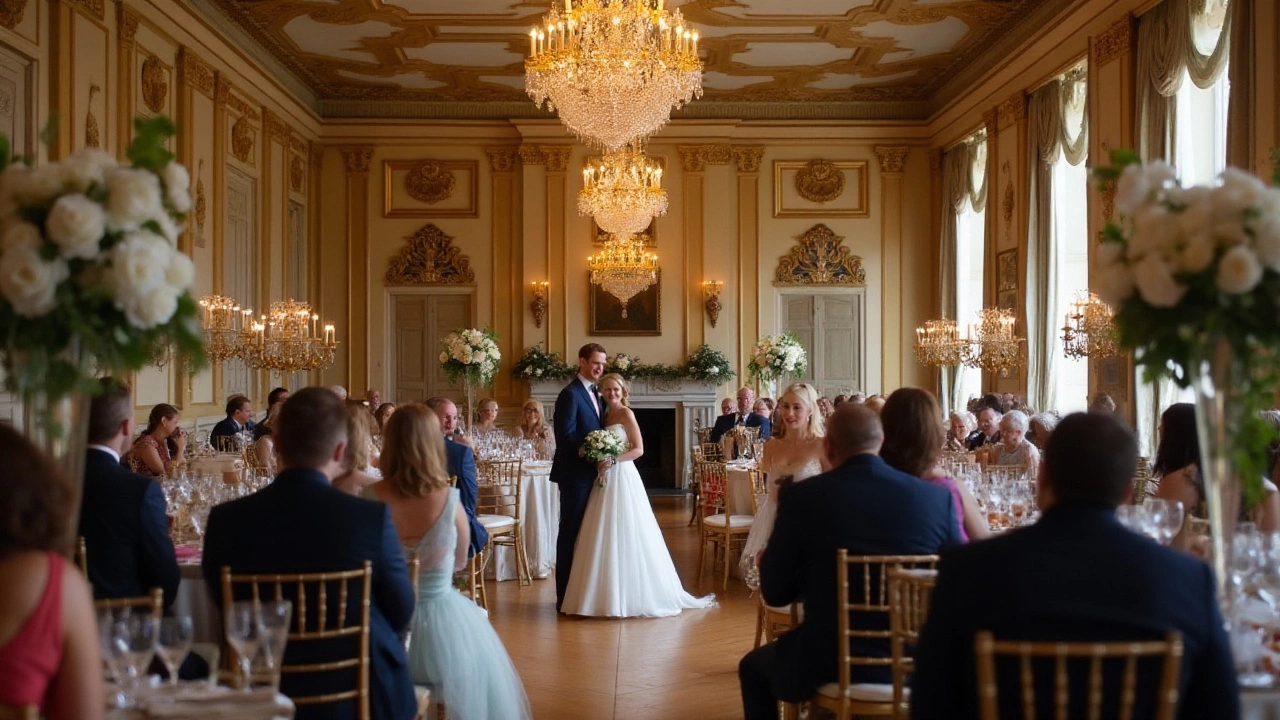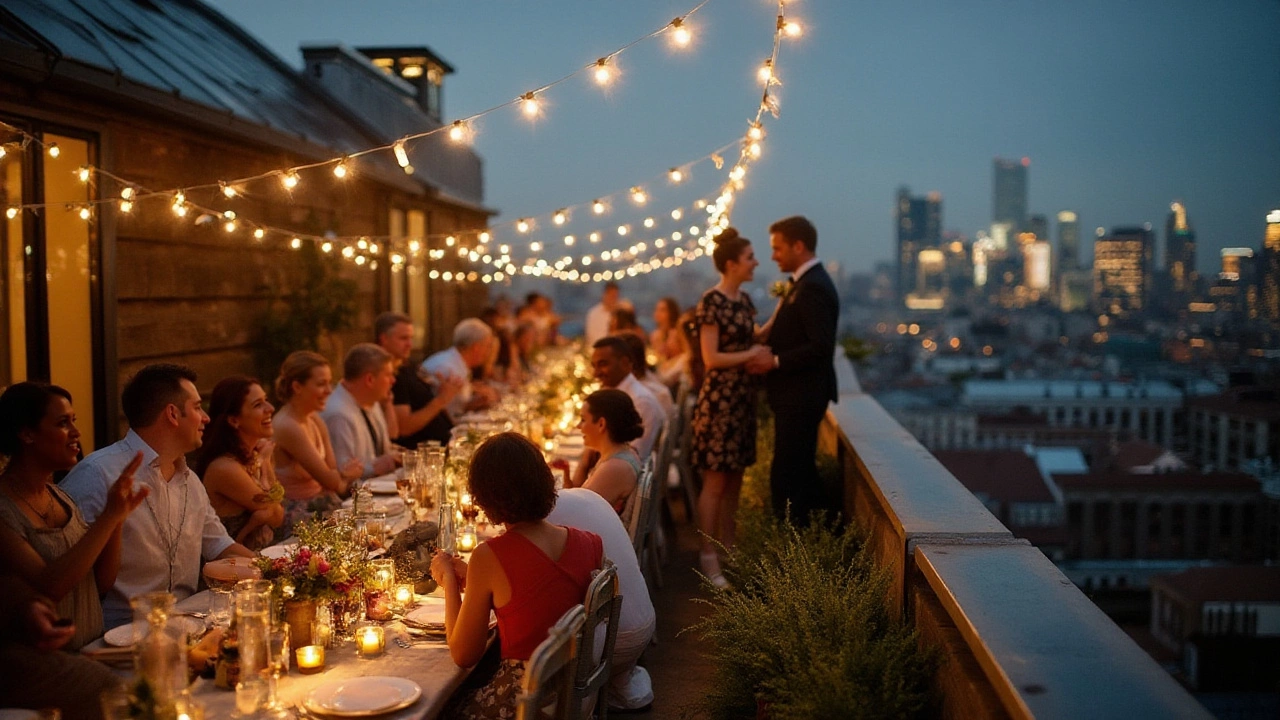In the beautiful maze of wedding planning, one of the most significant pieces is the venue. It's not just about securing a space; it's about finding the perfect backdrop that sets the tone for your celebration. Navigating the terrain of wedding venues, especially with cost considerations in mind, can feel overwhelming at first. But with some guidance, you can find a balance between dreams and budgets.
What does a 'realistic' price for a wedding venue even mean in 2024? It's subjective, often shaped by personal preferences and specific needs. However, understanding the landscape of what you're buying into can make all the difference in making smart, informed choices. In this article, we dive into how venues are priced, what you can expect to pay, and ways to secure a space that both you and your wallet will love.
- Understanding Venue Cost Variables
- Popular Venue Types and Their Price Ranges
- Hidden Costs and How to Manage Them
- Cost-Saving Tips Without Compromising Quality
- Making the Most of Your Wedding Budget
Understanding Venue Cost Variables
When embarking on the wonderful journey of planning a wedding, understanding the various cost variables associated with wedding venue cost is crucial. Cost considerations go beyond simple venue rental fees; they're a complex tapestry woven from multiple factors that need to be acknowledged to effectively manage a realistic wedding budget. One of the primary factors influencing costs is the venue location. A picturesque vineyard in the Hunter Valley may have vastly different expenses than a chic rooftop in Melbourne’s bustling city center. Geographic appeal often commands a premium, as does exclusivity, where venues hold the allure of being a hidden gem.
Another vital aspect affecting cost is the time of year your wedding is scheduled. Peak seasons such as spring and early summer see a surge in demands, hence driving up prices. Handy tip: consider looking into shoulder seasons like winter or early autumn when venues may offer discounted rates while still enjoying pleasant weather. Equally influential is the day of the week you decide to host your wedding; weekends typically fetch higher prices compared to weekdays owing to demand and convenience. The size and type of the venue impact costs too—a lavish ballroom will command a different fee structure compared to a cozy, rustic barn wedding.
The guest count is another pivotal variable. Many venues charge per head, which means each additional guest not only adds charm to the occasion but also adds to the tab. With this parameter, you’re not only accounting for space but also the needed catering services, staff, and overall logistics. “The larger the wedding, the more logistics to account for,” notes
Emma Rose, a renowned wedding planner based in Sydney, “from seating to catering, each element scales with your guest list.”
Let’s not forget the integral part of amenities and added services. Some venues offer more than just a space—they provide an experience, complete with in-house decorators, catering, and planning assistance. While these services add convenience, they undeniably add to the cost. It’s worth considering what’s included in the venue hire and what might incur extra charges. Tableware, linens, lighting, and sound systems may be part of the package at some venues or might be a la carte options at others. Understanding what you get for your money is essential in gauging how it fits into your 2024 wedding planning.
In navigating venue costs, think not only about the aesthetics but also about the behind-the-scenes expenses that ensure everything runs smoothly. From setting up to clean-up, these services, though often unnoticed by guests, are critical and can often surprise couples when revealed in the final bill. Hence, transparency during initial consultations is key; ensure that all aspects of the venue cost are discussed comprehensively to avoid any hidden surprises on your special day.
Popular Venue Types and Their Price Ranges
Choosing a wedding venue can feel like searching for a needle in a haystack, but understanding the types of venues and their associated costs can light the way through the fog. Venues come in all shapes and sizes, from rustic barns to opulent hotel ballrooms, and each has its unique pull on the budgetary purse strings. To help narrow down the avalanche of options, it's essential to consider both the ambiance each venue type offers and how that ties into the overall price you might expect to pay in 2024.
Outdoor gardens, for instance, are immensely popular for their natural beauty and relaxed ambiance. The cost for such venues in Australia can range significantly, often starting from around AUD 4,000 and climbing upwards if you desire extras such as floral arrangements or outdoor lighting. Many couples adore the notion of tying the knot against a picturesque backdrop of nature, but keep in mind that weather unpredictability often necessitates additional planning—and potentially, an indoor contingency.
On the other end of the spectrum, luxury hotel ballrooms provide a touch of elegance and convenience that's hard to surpass. Prices here are generally steeper, reflecting the comprehensive facilities and professional services on offer. It's not uncommon to encounter venue fees starting from AUD 10,000, with packages potentially including everything from catering to guest accommodation, making them an attractive all-in-one solution for many. While the upfront cost may seem daunting, the simplicity and elegance often play a decisive role for couples who crave a streamlined planning process.
For those drawn to the charm of history, heritage sites and mansions provide a unique blend of classic beauty and grand sophistication. Renting such a venue might set you back anywhere from AUD 5,000 to AUD 15,000. These storied spaces often captivate with their architectural splendor and rich past, creating an enchanting setting that's difficult to replicate elsewhere. However, be prepared to split costs between venue hire and additional essentials like catering or audio-visual setups, as these often aren't included.
Industrial spaces, like converted warehouses or lofts, have surged in popularity due to their customizable nature and trendy appeal. The blank-canvas aesthetic allows couples to infuse their personalities into the décor, though this often results in variable pricing. Starting prices might be around AUD 3,000, but customization can easily see this rise. It's here, in this divergence of base cost versus designed experience, that some of the most innovative weddings take shape.
For a touch of romance by the waves, beach venues offer a serene escape, generally priced between AUD 2,000 and AUD 8,000, depending on location and amenities. While prices are often kinder to the budget, there's usually more planning involved regarding permits or catering logistics to consider. This type of venue is perfect for those who dream of saying ‘I do’ with their toes in the sand and salt in the air.
According to The Knot Real Weddings Study, the location of a wedding can greatly affect cost, with city weddings generally costing more due to demand and availability.
These figures represent rough estimates to give a ballpark idea; the actual costs can vary based on geographical location, day of the week, and amenities offered. Knowing the type of venue that resonates with you is just the starting point; understanding the associated costs and being open to flexible options will ensure you're making the most informed decision. Striking a balance between your dream venue and a realistic budget is possible, and knowing the prices can help lead to finding that perfect spot.

Hidden Costs and How to Manage Them
When planning a wedding, most couples focus on headline costs like venue, attire, and catering. However, many are surprised when unexpected expenses creep in, seemingly out of nowhere. These hidden costs can turn a well-planned budget upside down if not anticipated, and they can often turn a dream day into a stressful experience. Understanding these financial surprises can make your planning smoother and keep unpleasant shocks at bay. Let's explore the various areas where extra charges are likely to turn up and how you can expertly navigate them.
Firstly, consider vendor fees associated with your wedding venue cost. Some venues may require you to use in-house services for catering or decorations, often at a premium price. It's essential to clarify this during initial discussions to avoid any compulsory charges later on. Make sure to ask if there are corkage fees if you're considering bringing your own alcohol. Venues might also charge additional fees for service staff, particularly if your event runs overtime. Awareness of these fees can prevent last-minute disruptions to your budget.
Service charges and taxes are another realm where costs can balloon unexpectedly. Often, quoted prices exclude local taxes and service charges, which can add a significant percentage to the total cost. These charges can vary dramatically depending on location and venue. Ensure you request a full price breakdown, so taxes and service charges are transparent from the start. It's important not to get caught off guard here, especially in regions where these costs might be higher.
Decoration and setup costs can be particularly tricky to estimate. While some venues may provide basic decoration within the package, you might face additional charges if you want everything to align precisely with your vision. Customized lighting, floral arrangements, and specialty linens are examples of how personalization can lead to unexpected venue pricing increases. A detailed understanding of what's included in your venue package is crucial, and always leave room in your budget for potential aesthetic upgrades.
Don't forget about transportation logistics—this is a common oversight in wedding planning. You may have to cover parking fees for guests or rent shuttle services, especially if the venue is remote. Additionally, consider the accessibility of the location not only for your guests but also for vendors who might charge travel fees. The placement of your venue in relation to public transit or airports can affect these costs, so plan accordingly to keep transportation headaches to a minimum.
Insurance is an invaluable but often overlooked cost. While it’s an additional expense, wedding insurance can protect you against unforeseeable incidents, ranging from vendor no-shows to severe weather disruptions. The peace of mind it provides is often worth the premium, yet many couples forget to include it in their budget early on. Learning from others' experiences through reliable testimonials and recommendations is a practical way to understand its benefits.
"The average couple spends about 40% more than planned on their wedding," says Jen Glantz, a renowned wedding planner. "Understanding and preparing for hidden costs is key to managing your budget wisely."
Finally, miscellaneous charges such as gratuities, sound permits, and liability coverage can quickly add up. Each of these items might seem small individually but can accumulate to quite a sum. Set aside approximately 5-10% of your total budget to accommodate these inevitable, albeit minor, conditional costs. Proactively discussing these finer details with your venue and vendors early can ensure a seamless experience from start to finish in your 2024 wedding planning journey.
Cost-Saving Tips Without Compromising Quality
When it comes to planning a wedding, staying within budget while maintaining a level of elegance that matches your vision can be a daunting task. However, with strategic decisions, you can have both. One way to save on wedding venue cost is to consider the timing of your wedding. Opting for a date in the off-peak season can significantly decrease expenses. Many venues offer discounts during months that are less popular for weddings. Moreover, a weekday wedding can be a viable and yet charming option, reducing costs substantially compared to the traditional Saturday affair.
Another effective method is to be strategic about the location. Explore venues outside the city center; the costs tend to drop the farther you move from urban bustle. Rural properties, barns, or even beautiful gardens can offer not only lower rental fees but also a distinctive aesthetic that stands out. Plus, when you utilize the natural beauty of the venue's surroundings, you can cut costs on decorations.
Consider simplifying the guest list as well. Reducing your guest count can reduce catering costs and the size of the venue you need, which directly affect venue pricing. Additionally, explore the idea of combining your ceremony and reception at the same location to eliminate transportation costs and separate venue fees. Many venues have packages that include everything, from seating arrangements to sound systems, often at a lower price than sourcing each item independently.
"The most successful weddings are those that strategically allocate resources," says wedding planner Lauren Greer. "It's less about cutting corners, and more about prioritizing what adds the most value to your special day."
You can also consider DIY elements for your wedding. Although it takes more work, the personal touch of hand-crafted centerpieces or homemade favors can replace costly decorations without losing the charm. Explore community resources such as local flower markets or event hire businesses that offer affordable décor rentals instead of purchasing new. Remember, every dollar saved on one item can be redirected to something else that may mean more to you.
When dealing with vendors, don't shy away from negotiating. Many are willing to offer discounts, especially if you can present them with a consistent business proposition like a referral or a mention online. Also, work with a venue that allows you to bring your caterers and suppliers to avoid mandatory premium costs. Look for all-inclusive packages that cover multiple aspects of the wedding. These can offer valuable savings compared to separate bookings, and they often simplify planning significantly, too.

Making the Most of Your Wedding Budget
Navigating your wedding budget efficiently can transform your planning process from a financial headache into a strategic journey. The key is understanding where to allocate your funds without compromising on what’s most important to you. Begin by setting a clear budget and itemizing essential expenses. This approach will provide clarity and prevent overspending. Industry insiders often recommend allocating about 30% of your budget to the wedding venue cost, but this can vary based on your personal priorities and the type of venue you choose. Knowing the average costs can guide you, but make sure to adjust these figures to reflect your unique vision and circumstances.
Prioritizing Your Expenses
Creating a hierarchy of priorities is a crucial step in making the most of your wedding budget. Consider what aspects of the wedding day are most important to you both. Is it the stunning location, perhaps one rich in natural beauty or historical significance, or maybe the cuisine takes the lead with top-notch catering? Decide if you’d rather splash out on a lavish setting or go minimalistic for an intimate charm. Those decisions will guide how you invest your resources. A practical tip is to list all wedding components and rank them. This helps in determining where you can be flexible or where splurges are justified. Remember, your wedding day is a celebration of love, and your budget should reflect the essence of your relationship rather than succumb to societal pressures.
Smart Saving Strategies
After your priorities are clear, it's time for some smart saving strategies. Investigate seasonal pricing variations; wedding venues and vendors often offer discounts during less popular months or days. A weekday wedding might not only cost less but also enhance availability of sought-after venues and services. Another savvy strategy is choosing a venue that allows you to bring in your own vendors. This can be an excellent way to manage costs as it gives you the flexibility to negotiate directly with service providers. Something as simple as trimming your guest list can also alleviate budget stress, letting you focus on curating a more personal and meaningful experience for those present.
The Knot’s 2023 Real Weddings Study notes, "Couples are getting more creative with their budgets by breaking down costs and prioritizing experiences that reflect their personalities over traditional expectations."
Negotiation and Flexibility
Negotiation is an art that can pay off substantially when aiming to maximize your wedding budget. While many venues have fixed prices, there’s often room for negotiation, especially if you’re willing to compromise on less busy seasons or dates. Approach discussions respectfully, clearly stating what your budget permits, and see if there's wiggle room to accommodate your needs. Flexibility and creativity in your choices could unlock opportunities that aren't immediately apparent, such as option bundles that venues might not publicly advertise. Additionally, some venues offer discounted packages that include essential services like setup, cleanup, and accommodations, which can help keep unknown costs at bay.
Utilizing Technology and Resources
In today’s digital age, technology can be your ally in planning an affordable yet beautiful wedding. Use budgeting apps that are tailored to wedding planning to keep track of expenses and receive alerts when you’re nearing your limits. Websites and social media platforms can provide valuable insights and reviews, helping you find vendors who align with your visions and financial constraints. Furthermore, joining online communities or forums for brides and grooms can offer support and ideas you might not have considered. Often, you’ll find recommendations on unexpected ways to save or clever alternatives to costly traditional choices.
